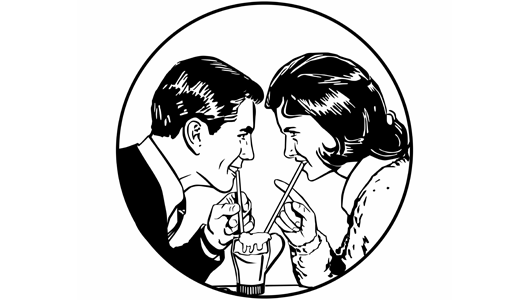
Can You Get Herpes From Sharing a Drink?
Have you ever been nervous to share a drink with someone because you know they have herpes and you're worried you might catch it? If so, you're certainly not alone! Herpes is one of the most common (and misunderstood) STIs, and even people with HSV aren't always sure about how it's transmitted.
So let's clear the air, shall we? In this guide, I explore the types and symptoms of HSV, how it's passed from person to person — and yes — whether or not you can get it from sharing a drink.
Understanding Herpes Simplex Virus (HSV)
Let's start with the basics: what is herpes, anyway?
Herpes simplex virus, also known as HSV, is a highly contagious virus that's broken up into two categories: HSV-1 and HSV-2. HSV-1 is typically spread through oral secretions, while HSV-2 is usually transmitted through genital contact. (1)
Once contracted, herpes remains in the body forever, meaning there is no cure. It can cause episodes of illness, which include tender sores or lesions on the mouth or genital area, fevers, throat pain, muscular aches and enlarged lymph nodes.
I know it doesn't sound great, but keep in mind that over 80% of the global population has herpes! It's incredibly common, symptoms are very treatable, and outbreaks become more mild over time. Some people experience outbreaks so infrequently, they forget they even have HSV. (2)
That said, it's essential to be mindful of potential symptoms, and consult a doctor if you think that you may have contracted herpes. Remember: those infected with HSV can still transmit the virus even when they are not displaying active outbreak signs.
So, does that mean you can give someone herpes by sharing a drink, even if no one is experiencing an active outbreak? Let's dive deeper into the details.
Can You Get Herpes from Sharing a Drink?
Let's get right down to it. Yes, sharing drinks can increase your chances of contracting herpes, specifically HSV-1. Is it likely? No. Actually, the chances are incredibly slim. But it's not impossible.
HSV-1 can be present in a person's saliva even without visible outbreak symptoms, making it easy to transmit through non-sexual contact like sharing a straw or kissing. Can you get herpes from sharing a drink with different straws?
While using separate straws reduces the risk of contracting herpes, it's best to avoid sharing altogether during an active outbreak. Again, the chances of transmitting herpes by sharing a drink are low, but there are some things you can do to bring that risk to zero:
- Clean and sanitize: Always wash shared dishes and utensils thoroughly with hot water and soap before using them.
- Avoid direct contact: Use straws for drinks and disposable cutlery whenever possible to avoid directly touching items that may have come into contact with another person's mouth or saliva.
- Maintain personal items: Don't share personal belongings like toothbrushes, razors, lip balms, or makeup applicators since these can harbor viruses like HSV-1.
And knowledge is power! If you know you have herpes, it can help to disclose that information before sharing a drink with someone so they can make up their own mind as to whether they want to assume the risk.
Sharing Personal Items and Herpes
Practicing safe sex with condoms and other barrier methods is the best defense against herpes and other STIs. But what about sharing personal items like razors, towels and toothbrushes? Is that safe?
Well, herpes can be spread through different forms of non-sexual physical contact. Many people contract herpes in childhood after sharing a hug and kiss from an unwitting family member. If you're not sure of someone's HSV status (or your own), it's safest to refrain from certain forms of close physical contact.
To prevent transmission, here are some things not to share:
- Razors: Use your own razor to avoid sharing blood cells carrying infectious agents.
- Toothbrushes: Keep your pearly whites to yourself and avoid sharing toothbrushes that can harbor germs from an HSV-positive person's mouth.
- Towels: Avoid sharing towels, as they can briefly retain body fluids carrying viruses like HSV-1.
- A casual kiss: HSV-1 is easily transmitted through saliva, so keep the casual kissing at a distance if you don't know a person's status.
You are much more likely to contract herpes by sharing saliva and body fluids during sex than by sharing personal items. Unless, of course, those personal items are sex toys.
Can You Get Herpes from Sharing Sex Toys?
Short answer: yes.
When you use non-porous, body-safe sex toys made from materials like silicone, stainless steel, and glass, you nearly eliminate your risk of contracting infection. Non-porous toys can be completely sanitized, making them safe to share among partners, regardless of HSV status.
Toys made from materials like jelly rubber (PVC) and TPE cannot be thoroughly cleaned or sanitized. PVC and TPE sex toys are porous and can harbor infectious bacteria and other pathogens, including sexually transmitted infections like herpes.
But don't worry: when you pick body-safe products and employ proper cleaning and storage techniques, you don't have to worry about any of that! Not sure how to take care of your pleasure products? Read this complete guide to cleaning your sex toys for all the answers.
Final Thoughts
While the risk of contracting herpes from sharing drinks is low, it's still possible. And you know what they say: better safe than sorry! So go forth and enjoy safe sex (and drinking!) practices, and refer to this guide whenever you need a reminder.
Oh, and don't forget to follow Delicto on Instagram and TikTok for more sex toy reviews, tutorials, and sex education!
